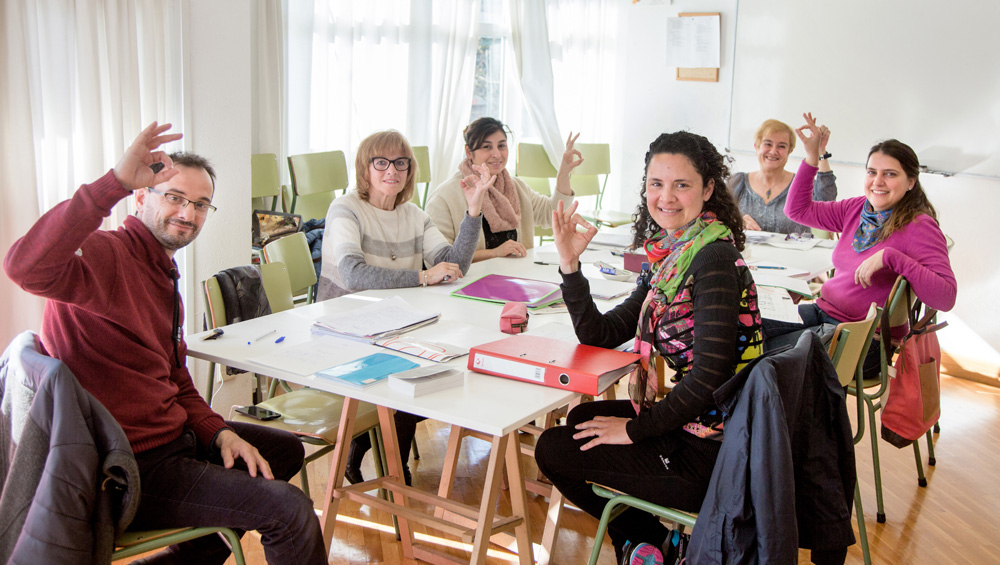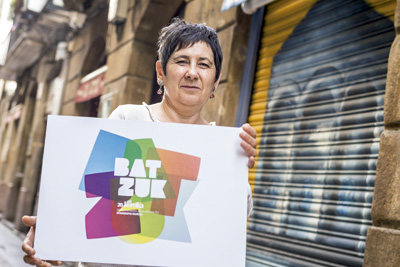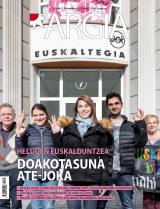Gratuity on the political agenda
- It is the usual demand: that citizens have the opportunity to learn Basque for free. It is far from materializing, but it seems that the CAV Vice-Chair of Linguistic Policy intends to take a firm step in the 2017-2018 course: It will be free up to level B2. However, the requirement is not to the liking of many: tuition is paid by the student and the money will only be returned if the test is passed.

In the Autonomous Community of the Basque Country, there is currently a complex system of scholarships and grants for the learning of the Basque Country. In other words, there is no unity and there are subsidies at municipal, foral and Basque Government level. Everyone has their own criteria. You may have the opportunity to learn for free in one municipality and not in another.
PNV and PSE-EE have received the government pact free of charge. They have announced that they will work for free on the road to level B2 and that they are working on the HAKOBA process. Different aspects and private Euskaltegis homologated understand gratuity differently. The announcement made by the two parties of the Government is that the student will pay the tuition, then take the examination of the relevant level and if he passes it he will refund the money, and if not, not. The Vice-Ministry of Language Policy of the Basque Government will allocate a total of 1.250.000 euros to the elaboration of these steps.
If the test fails, do you have to pay for it?
The private Euskaltegis sector and some parties have agreed on the new path that the government has opened to take steps towards gratuitousness, but they do not agree with some criteria.
EH Bildu presented on 9 March a non-legislative proposal on how to take steps on the free path to learn Basque. The party believes that the citizens of the CAV must have the opportunity to learn the two official languages, and this is not the case because the Basque learning process has a significant economic cost. It recognises the existence of ways to alleviate the economic efforts of citizens through scholarships and grants. The Basque Government considers the system of economic aid to be "chaos" and calls for the unification of the system. The party has made three specific requests, so it has asked for extradition. On the one hand, from the 2018-2019 course the aid system is unified, universal and egalitarian, and therefore the learning process up to the level C1 (included) is free. On the other hand, that the gratuitousness of the course is not conditioned to the passing of the exam, but rather that the objective is the achievement of communicative competence in Basque and the use of school hours. Thirdly, that the Basque Government should work with public administrations and sectoral players in the design and decision of these steps. Also, Elkarrekin does not link gratuitousness with passing the exam, but with the achievement of levels of commitment and attendance by the students.
Lanbide, taking the first steps
In the Basque Employment Service, Lanbide, there has been virtually no possibility of studying Euskera or carrying out in Basque the training courses it offers. The door has been opened a bit in the course 2016-2017. HABE and Lanbide signed a cooperation agreement, through which several unemployed people have been able to learn Basque. In the three areas, commerce, hospitality and socio-health services to the community, through the registration form, all unemployed were offered the opportunity to learn Basque. We opted for the implementation of these three areas, precisely because they allow the use of languages at work. As a result of the agreement, 92 people registered and are now learning Basque. In Álava, 15 citizens attended their studies, in Bizkaia 53 and in Gipuzkoa 24. The objective of the Basque Government is to give the opportunity to all unemployed people registered in Lanbide to learn Basque in the Basque Country during the 2017-2018 academic year.
.jpg)
EH Bildu has presented in the Basque Parliament a non-legislative proposal on the equal integration of the two official languages in the training actions promoted by Lanbide. The coalition has criticized that Lanbide drives hundreds of courses for workers and the unemployed, and that courses in Basque or Basque have been “scarce and anecdotal”. When EH Member Bildu Rebeka Ubera asked her about various courses, the Minister for Employment and Social Policies responded on 20 December 2016: “None of these courses have been held in Basque.” The courses could not be held in Euskera, but the agreement between Lanbide and HABE allowed to receive Euskera classes outside the regular curriculum and, therefore, outside the school hours. Eh Bildu has criticized that in the Lanbide courses you can learn English related to work, but you cannot learn Basque. For example, whoever wants to be a bar waiter has a module to learn English in his formation, while the Basque module does not. In the non-legislative proposal, the coalition also describes the following situations: There are courses called “Attention to the public” in several languages, “Communication in Catalan” is offered and English can be studied from level A1 to level C1. There's nothing like that in Basque. EH Bildu has recalled that the decree governing vocational training for employment in the CAV states that workers have the right to receive vocational training for employment in either of the two official languages of the CAV.
Mertxe Mugika, AEK General Coordinator
“We ask that gratuitousness not be so tied to the academic outcome”
We took Mertxe Mugika in a hurry. Busy, but willing to talk about the historical demands of private Euskaltegis: that students learn for free and that Euskaltegis have stable funding. The AEK General Coordinator has called for a stop to turn around in the roundabout and move from words to deeds.
The Vice-Ministry of Linguistic Policy of the Basque Government is amended. Have you been with them and what have you told them?
The same things have been said to the previous team. We have been demanding for many years the literacy of Euskaldunization of adults, and above all the normalization of the situation of the Euskaltegis of our kind, that is, those of social initiative. Let us see if measures are put in place in this legislature and we are not turning around in the roundabout. They also say that that's what they need.
We have taken into account what appears in the Governing Pact. The Governing Pact states that Basque learning up to level B2 should be free of charge. We say that we must move from what has been said to what has been done. The resources needed for free access up to B2 will be essential.
It's not a good sign to be saying the same things to the new government.
There is a change in both the government pact and the PNV programme. These are, however, issues that come from the previous legislature. In recent years we have been saying that gratuity has to enter the political agenda and when we knew that the government pact was already free until B2, we said: “We have managed to take into account what we have proposed.”
In the last legislature, on the road to the stability of the Euskaltegis of social initiative, work was done to calculate the cost of a standard Euskaltegi, although this document is not yet known. Some work was therefore under way.
In the coalition government are the PNV and the PSE-EE. The second did not make any gesture in favour of the Basque people in the electoral campaign or in the electoral campaign. Do you think it will affect the coalition?
We do not believe that the attitude shown during the campaign will prevail. This type of discourse has no place, there are other postures on the street, and they are favorable to the Basque country, although there will also be reactions. When there is a Public Job Offer, people come to the Basque Country to prepare it normally, since it is assumed that to access a job the Basque country is necessary. Ararteko has recommended that Lanbide should also offer Euskera, as it opens the way to job search. For some it will be difficult to move through the comfort situation, but the wave leads us to another direction. At the moment, 30,000 people are learning Basque. This figure shows that this society needs Euskera for work, because it wants to live in Euskera, because they are driven to use Euskera for the environment. There are often no requirements.
So, speeches like the PSE-EE, and reaching gratuity, for example, don't match.

That students can learn Basque for free is a claim of years. What is done and what remains to be done?
It is a historic claim. Steps have been taken. However, there is tremendous chaos. The system of scholarships or grants in which the student resides is modified. For example, a CAPV student, if he's in the database and exceeds one level, has a scholarship. The Provincial Council of Bizkaia has another system, if the student passes the exam he must use the scholarship to pay the tuition for the next level, otherwise he loses the money. The Álava plan is being prepared in a different way: it will not link the grant with the result, but with the registration and attendance of the classes. The one in Gipuzkoa has another way, each city council has its own... Tremendous chaos, and yet, all systems are welcome.
Order the scholarship system. The system must be fair, egalitarian and universal. The amount to be paid by the student shall be limited, yes or no. Rates can be set that affect everyone equally, as municipal Euskaltegis registrations are cheaper, for example.
It will be free up to level B2 if the tests are passed.
We ask that it not be so tied to the academic outcome. Some citizens also find it difficult to pay tuition (even if the money is returned after the examination).
After all, what is the purpose of Euskaltegis, to get the graduates out or to get the people who live in Euskera every day? We have to encourage Euskera to be a user and not to have graduates. The title itself is neither good nor bad, but without the objective it should be a means, and these kinds of measures lead us to do so many times, to turn the objective into a title.
We do not say at all that ‘open doors’ must be made, but there is more than one system to choose from and subsidies must be ordered.
Lanbide has begun to offer the possibility of learning Basque.
It has a broad line of training and so far the Basque Country has not been present. The agreement has been signed by Lanbide and HABE. What we hope is that the next course the people enrolled in Lanbide can sign up for the Euskaltegi they want and learn for free. In addition, the initial steps were well thought out, linked to the use, i.e., students of hospitality and commerce, among others.
Another of the annual demands of the approved Euskaltegis is stable funding. Through the Basque Government they cover 70% of the costs and say that they would like to reach 80%.
We all tell them the same movie. The Euskaldunization of adults is divided into two parts: municipal Euskaltegis and private initiative Euskaltegis. The municipal Euskaltegis cover 30% of the demand and the rest. The difference between the two is enormous, both in the working conditions of the workers and in the tuition fees that the students have to pay. But we offer the same service, and the service does not reach everywhere, that is, in the capitals there is no Euskaltegi municipal. On the one hand, yes or no Euskaltegis must be matched. In municipal Euskaltegis, the class time is 74 euros for teachers and 37 euros for social initiative teachers. We ask that the ravine be fixed, not that the number be reduced to the municipal Euskaltegis. On the other hand, there must be something that goes beyond the concept of subsidy, as is done with the centers, with EITB, with the university. We cannot stand up to the annual budgets or the governments on duty.
We are talking about gratuitousness and funding. What other claim do you have?
We want to develop correctly the accreditation system of the Basque level, which is directly related to the pedagogical and didactic model. Investments in pedagogical and didactic fields must be reoriented, and the forms of learning are changing.
I thought you'd already worked a lot in this field.
As far as administration and abroad are concerned, the image we Euskaltegis give is often that of funding or money, and we miss all the work that is being done in pedagogy. We are now climbing and lowering the Korrika, but whenever I have occasion I like to talk about the pedagogical and didactic area.
Any other challenges?
As far as Euskera in general is concerned, we have long behind the word cooperation, and we will be one of the main drivers of this, but we believe that the same word is beginning to run out and that we have to start something between the administration and the social partners. The roundabout must stop, and that has been said by this new group [the Vice-Ministry of Language Policy] on more than one occasion. In Navarra and Iparralde there are also such noises.











